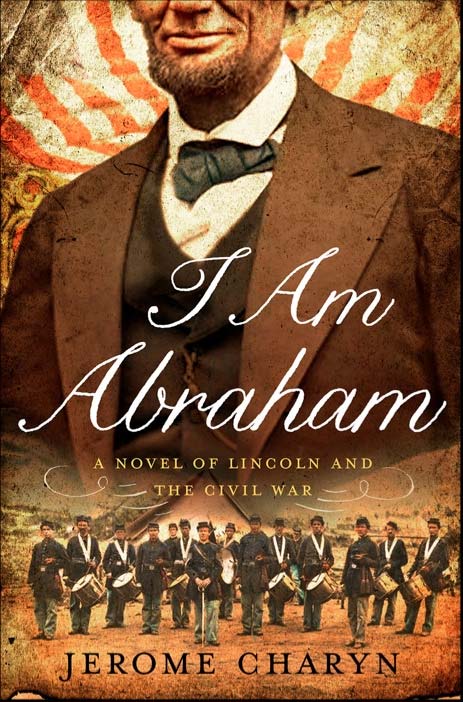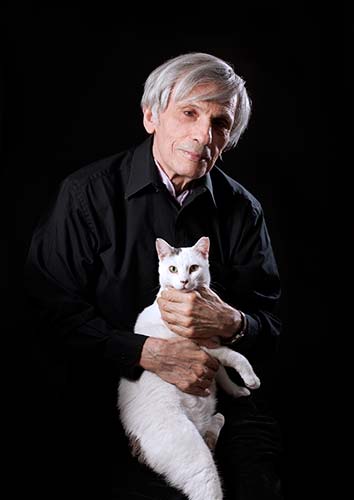

By Steven Jay Griffel
Queens, NY, USA
When a novelist writes a provocative book, a touchstone book – one likely to incite discussion, argument, even controversy – the author's work is not likely done with the book's publication. If the novelist is already acclaimed and media savvy, it is likely that he or she will have much to answer for.
Such was the case for Jerome Charyn when his brilliant novel I Am Abraham was published in February 2014. With his fiftieth book (the story of Abraham Lincoln's life told in the first-person by our only wrestling, rail-splitting, poet-president), Charyn ignited a firestorm of applause and challenge from historians and critics, malefactors and fans.
I reached out to Charyn this past Fall to continue our conversation that appeared in Stay Thirsty Magazine last Winter.

STEVEN JAY GRIFFEL: What do you see as your own relationship with Lincoln?
JEROME CHARYN: In order to write this novel, I had to become Lincoln – to take Mary to bed, to struggle against Bob, to lose my own sons, and to lead my nation through horrendous times. For me the novel has never ended. I still carry Lincoln's voice inside my head and I don't think I will ever be able to shake myself free of that voice. I will always write from Lincoln's perspective.
STEVEN JAY GRIFFEL: You richly capture Lincoln's voice – where did his remarkable language come from?
JEROME CHARYN: Lincoln was unschooled. His mother, father, and stepmother were illiterate – his father refused to allow him to read and even threw his books in the fire. And yet he understood from a very early age the power of words and his need to define himself through language. Where did the power of his great speeches come from? No other president ever wrote with the same music and eloquence and sadness. He was literally a man who defined himself with every speech, with every letter, with every gesture. This is one reason why he fell in love with Shakespeare. He could impose himself on Shakespeare's great heroes and villains – Falstaff, Hamlet, Richard III, Macbeth, and Lady Macbeth. Because he himself was Shakespearean, as Edmund Wilson said in Patriotic Gore, he imposed himself upon the nation as a poet.
STEVEN JAY GRIFFEL: What was it like to stump for a book about Abraham Lincoln?
JEROME CHARYN: There are so many Lincoln fans out there that you have an instant audience. But this audience is often very biased and wants their own ideas reflected in what you have to say.
The most interesting encounter I had was with a retired officer at the Soldier's Home attached to Lincoln's Cottage in Washington, DC. I had forgotten that it was still a soldier's residence and he appeared like a kind of ghost out of Lincoln's own past. And for a moment, I was actually stunned to hear that he was living on these grounds; I felt like Lincoln speaking to my own troops.
STEVEN JAY GRIFFEL: What did you learn about contemporary views of Lincoln?
JEROME CHARYN: When we put up our Lincoln Facebook page, I was shocked to see how many Lincoln haters there were. There was nothing I could do or say that would change their minds. Where did all this vitriol come from? They made Lincoln sound like a dictator and a despot. None of them was willing to feel his pain, or even to admit that he had any kind of pain when he sent troops out to battle. And I realized that we were still fighting the Civil War.
STEVEN JAY GRIFFEL: Please share your opinions about President Obama as they relate to President Lincoln.
JEROME CHARYN: When Obama was first elected, I felt that he would be another Lincoln or at least a Lincoln of our own time. He had the intelligence and the compassion of someone who could heal the nation and help those most in need of help. Soon I realized that the presidency itself was a trap; that there was little he could do to heal these wounds. Perhaps it's my own fault and I imposed myself upon Obama, but that's because I admired him so much. He worked with the poor in Chicago's ghetto areas, often climbing ten flights to bring meals to a blind, crippled woman. This was the kind of president I wanted. But he was soon mired in all the usual cross-party political battles. And I didn't find the eloquence that I knew was really there. I still feel in his last two years of office there will be greatness – and that some of Lincoln's poetry will come out.

Charyn and Chloe (credit: Jörg Meyer)
STEVEN JAY GRIFFEL: What are some contemporary issues that appear very relevant when discussing Lincoln's legacy?
JEROME CHARYN: Lincoln was the first modern president. Until he stumbled into the White House, blacks were utterly invisible and would have remained invisible for a very long time. He couldn't cure the evils of racism, but he at least made us aware that these evils existed.
We are fighting many of Lincoln's battles today, as minorities still remain vulnerable. I really feel that the recent Republican victory had more to do with the battles that Lincoln was trying to fight than with contemporary politics. We live under the aura of the Civil War.
STEVEN JAY GRIFFEL: How do we view Lincoln in the twenty-first century?
JEROME CHARYN: Lincoln is the only president, other than George Washington, who grows more and more modern. We tend to see Washington's limits as a man and as a general and yet fail to understand that he shaped our country in a way that no other president ever could. Lincoln also redefined the presidency. He was our president-poet-soldier, who had no vanity, nor any desire to embellish himself. He never understood the psyche of African-Americans, and yet he finally understood that we could have no country without them.
STEVEN JAY GRIFFEL: Let's get back to the book. Tell us about Mary, my wife always asks about Mary.
JEROME CHARYN: There have been so many depictions of Mary that it is hard to tell the difference between the woman and the myth. Like Emily Dickinson, Mary was much too intelligent and forceful for her own time. She suffered as most women suffered in the nineteenth century. She had been Lincoln's first general – he wouldn't have become president without her – and yet once they arrived in the White House, she was divorced from politics and thrown out of Lincoln's inner circle. She was cast off to redecorate the White House. She overspent, became a kind of hoarder, and almost committed treason – all in a search for her own political equilibrium.
STEVEN JAY GRIFFEL: Mary had so many suitors in her social class. What made her choose Abraham?
JEROME CHARYN: Mary must have sensed the deep yearning in Lincoln to redefine himself. She was drawn to him like a kind of magnet, and she waited for him, for nearly two years, after he spurned her. Unlike some other historians, I always believed there was strong attraction between them, and yet everyone seems to shy away from viewing them as sexual creatures – their wedding night remains almost a subject of amnesia.
STEVEN JAY GRIFFEL: Why was Lincoln's relationship with his eldest son, Robert, so complicated?
JEROME CHARYN: Robert was Mary's favorite – the child she consumed with love. She pampered him, educated him, made sure he went off to Harvard. What might Lincoln have felt about the kingly station of Harvard? Didn't it make him feel uncomfortable? And yet he fought in every way so his son could get in. Robert was moody, very ambivalent about his father's fame and presidency. Mary also wanted to make sure that Robert would never have to go off to war. And yet how could Lincoln protect his own child when he was sending off so many men and boys to their deaths? He had to plead with Grant as a father, and not as President of the United States, to accept Robert into his own military family. It pained Lincoln to make this plea, but he did it for Mary. And somehow by protecting Robert, he impaired himself. He wished he was the one who could have gone off to war.
STEVEN JAY GRIFFEL: Outside of Lincoln's immediate family, Elizabeth Keckly was most intriguing to me. Can you share your view of her?
JEROME CHARYN: I was both troubled and perplexed by the mystery and strength of Elizabeth Keckly, who served as Mary's dressmaker and confidante. A former slave, Keckly bought her own freedom and established her own dressmaker shop in Washington, DC. Jefferson Davis and Robert E. Lee were among her most important clients prior to the Civil War, yet her relationship with Mary Lincoln, so tightfisted, moody, and belligerent, is almost Shakespearean. Keckly practically lived in the White House; in my novel, she actually has her quarters in the attic. She is the only one who could soothe Mary's blinding headaches and fits of depression. Lincoln learned to respect her but could never feel the same intimacy. Keckly herself was a kind of war widow; her only son died fighting for the Union, and yet she wouldn't mourn her son's death in any conventional way. She was also the one who introduced Mary Lincoln to spiritualism and accompanied Mary to many of the séances in Georgetown, both of them believing that somehow they could commune with their dead children.
STEVEN JAY GRIFFEL: What new books can Charyn fans expect soon?
JEROME CHARYN: In June, Liveright/Norton will be bringing out a new collection of stories, Bitter Bronx, which is about my own experience living in a forgotten borough, so removed from the gold coast of Manhattan. When Robert Moses began to build the Cross-Bronx Expressway in the 1950s, he forever destroyed whatever little fabric the Bronx had left. If it were not for Yankee Stadium, the whole eastern half of the Bronx would be lying under the ground as bits of rubble. I wanted to become the bard of this lost borough.
Header photo – credit: Raha Majd
Links:
A Conversation with Novelist Jerome Charyn – Winter 2014
Jerome Charyn
Steven Jay Griffel at Stay Thirsty Publishing
Steven Jay Griffel on Facebook








